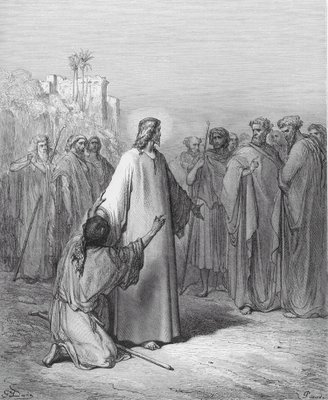18. Those who will be Given to Christ

.... "having no form or comeliness; and when we see Him, there is no beauty that we should desire Him. He is despised and rejected by men, a man of sorrows and acquainted with grief. And we hid, as it were, our faces from Him; He was despised and we did not esteem Him."
(Isaiah 53:2-3)
.... "The stone that the builders rejected became the chief cornerstone; this was the Lord's doing, and it is marvelous in our eyes."
(Psalm 118:22-23)
.... "Coming to Him as to a living stone, rejected indeed by men, but chosen by God and precious, you also, as living stones ..."
(1 Peter 2:4-7)
.... "For you see your calling, brethren, that not many wise according to the flesh, not many mighty, not many noble, are called. But God has chosen the foolish things of the world to put to shame the things which are mighty; and the base things of the world and the things which are despised God has chosen, and the things which are not, to bring to nothing the things that are, that no flesh should glory in His presence."
(1 Corinthians 1:26-29)
. . * Does any of this change the fact, that God foreknew which of these people would be adoptable, and that He would be calling them at the end of His efforts? "And in your book they were all written, the days fashioned for me, when as yet there were none of them." (Psalm 139:16). .... There is perfect harmony between these two points. But God must still begin such a work in their lives because no one is able to come to Him unless He does so. Even if He knows the end result, He must work in their lives toward obtaining that result.. * Please notice that no one was called or refused because of their own works, will, or efforts (John 1:13; Rom 9:16). God had mercy on them because of the humility He saw in them: and even this was the result of His own efforts in teaching them, drawing them, and working through their pre-appointed occasions, and outward circumstances (see Eph 2:10). .... In other word’s God’s criteria is in our lack of criteria. This will not seem strange to those who understand that God has confined us all under sin that He may mercy on all (Gal 3:22; Rom 11:32). This is simply a furtherance of the same concept for the same eternal purpose.. * One last point. Paul says that ‘not many’ wise, mighty, noble, etc., are called, but he doesn’t say ‘not any’. Some will be called. Actually, this brings us to the true heart of the matter: .... Those of the wise, mighty and noble who are called know better than to trust in themselves; they know they must empty themselves and place their trust in God alone – for this fulfills God’s eternal purpose. Paul summarizes with the real point two verses later by saying: "He who glories, let him glory in the Lord." (1 Cor 1:31). .... It’s simply that a foolish, weak, base or despised person is more likely to reach a humble conclusion about himself, and trust to God instead (1 Cor 1:27-28) See also Job 22:29; Luke 14:11; 18:9-14; James 4:6; 1 Peter 5:6.

0 Comments:
Post a Comment
<< Home